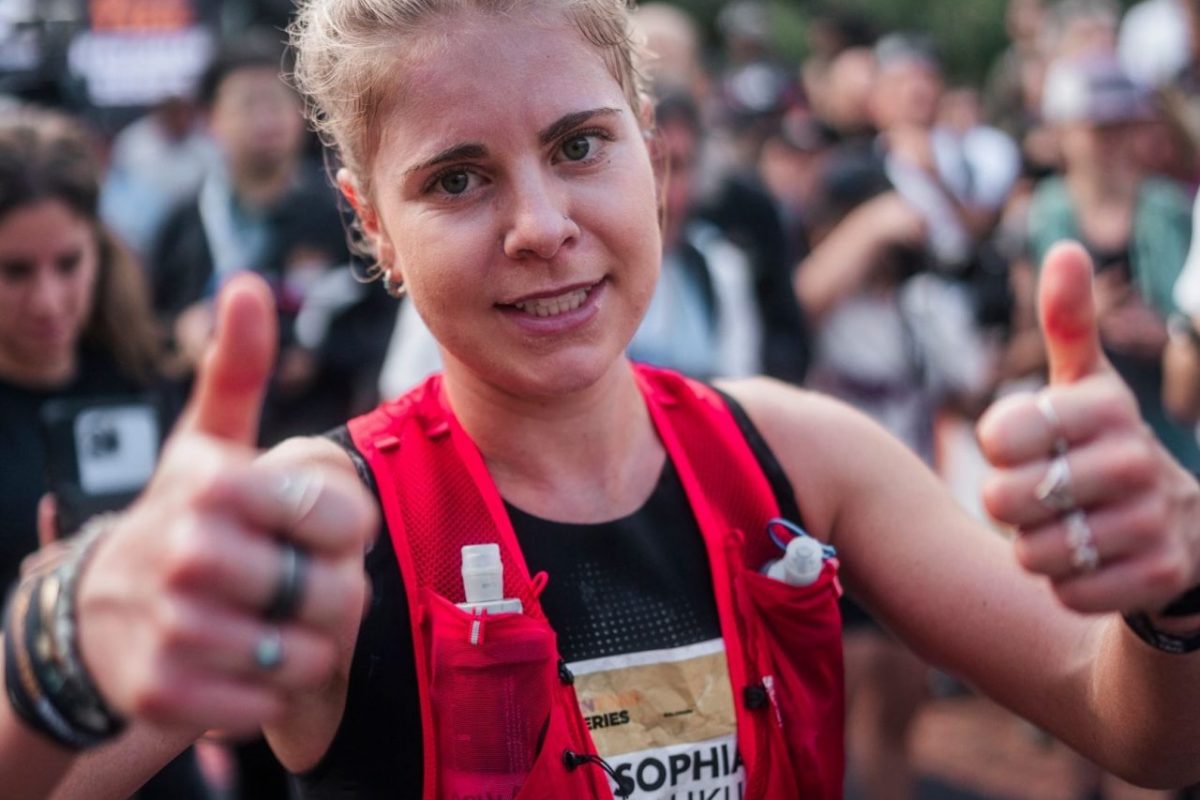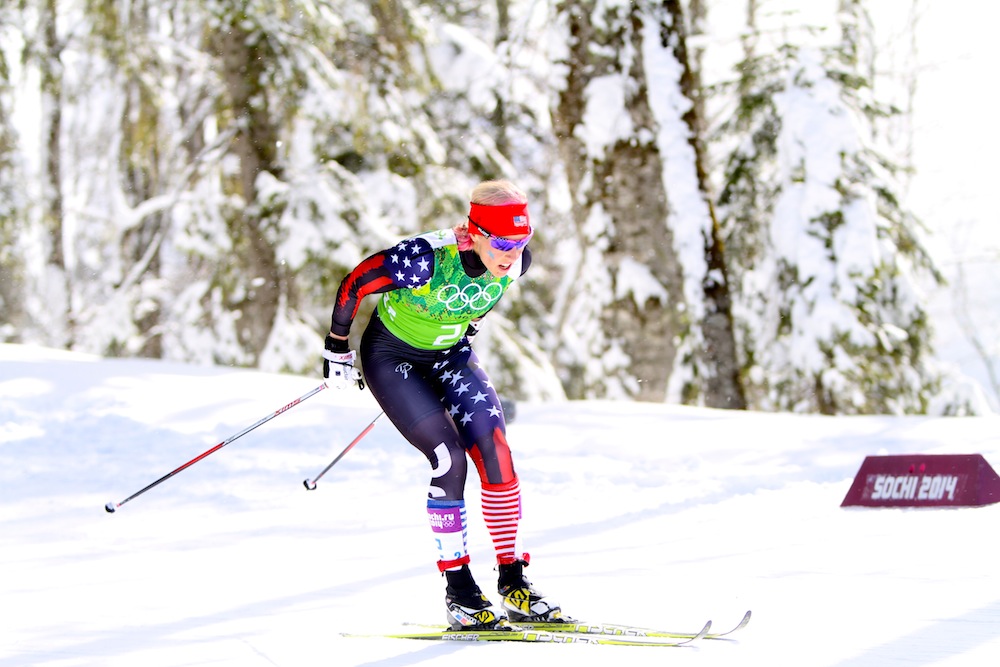
FasterSkier’s coverage is made possible through the generous support of Swix.
KRASNAYA POLYANA, Russia — For the first time in Kikkan Randall’s storied legacy with the U.S. Ski Team — at least since before the 2006 Olympics — the 31-year-old Alaskan wasn’t a shoo-in for the Olympic 6 x 1.3-kilometer team sprint on Wednesday.
She had been officially named the night before, selected by U.S. Ski Team (USST) coaches out of at least four athletes whom head coach Chris Grover described as almost “identically matched in their abilities.”
But the fact was, Randall had the most experience, and her coaches said she looked good in training. If you were going to take a gamble in a classic team sprint, which generally isn’t the U.S. team’s forte, it wasn’t crazy to go with her.
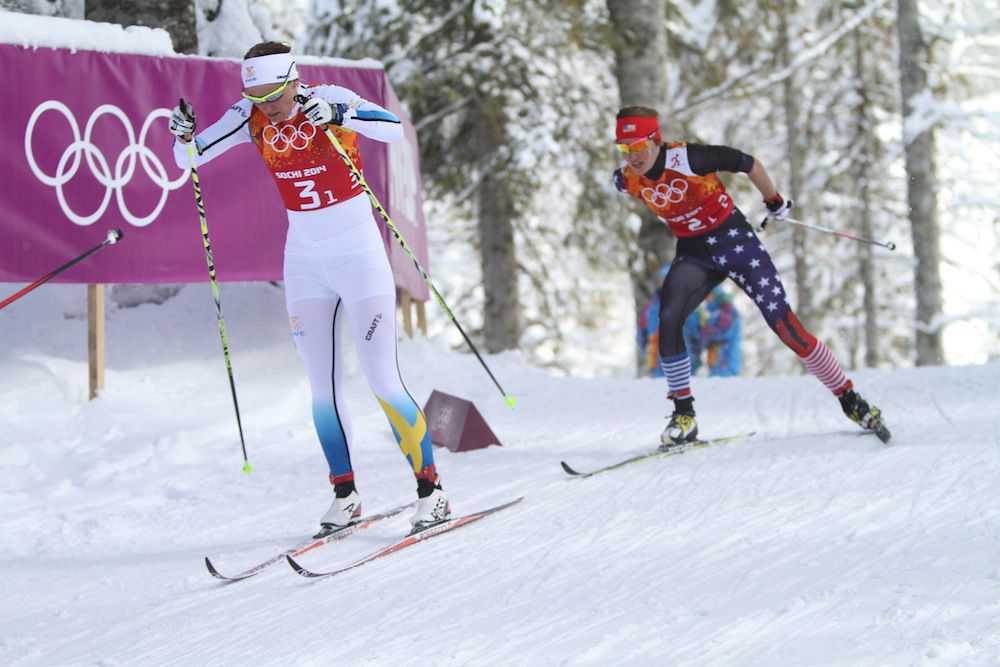
Sophie Caldwell was the other pick — justified after Caldwell, 23, became the first American woman to place as high as sixth in an Olympic cross-country race. She had finished sixth in the freestyle sprint last week, surpassing Randall’s previous individual best of eighth in the 2010 Olympic classic sprint.
You also had the revenge, or avenge, factor coming into play. Randall had her run for an Olympic medal cut short when she was eliminated in the quarterfinals of the skate sprint; four days later, she scrambled for the U.S. women’s relay, which placed ninth.
“I was really excited coming into today,” Randall said of the team sprint. “I was looking at every race here at the Olympics as a new opportunity for me. We know Sophie has been skiing so well so I was really excited about her possibilities.”
Third in the second semifinal behind Norway and Sweden, respectively, Randall had essentially eased up after the last downhill when she heard her coaches tell her she was in “pretty solid qualifying position,” she recalled.
Fighting for second with Sweden’s Stina Nilsson, Randall listened to their advice and decided not to go for the automatic qualifying spot in the top two.
“I knew that I didn’t need to totally dig deep in that final stretch there, knowing that the pace would most likely be faster in the final,” she said.
With Randall anchoring, the Americans finished 7.91 seconds behind Norway’s Ingvild Flugstad Østberg and Marit Bjørgen in first, and 2.6 behind Sweden’s Ida Ingemarsdotter and Nilsson in second. They were the first lucky losers in their semifinal, nearly 11 seconds ahead of Switzerland’s Bettina Gruber and Seraina Boner, who made it in fourth.
In the next hour or so before the final, Caldwell said she and Randall mostly put their feet up and rested as much as possible before racing three more times apiece around the 1.3 k course.
Strategy was tough to preplan, Caldwell said, especially given the challenging terrain and Olympic field. Before the final, the snow initially softened under sunny skies and T-shirt-like temperatures. And hour later, it was considerably colder than the semifinals, with temperatures dropping to a couple degrees above freezing.
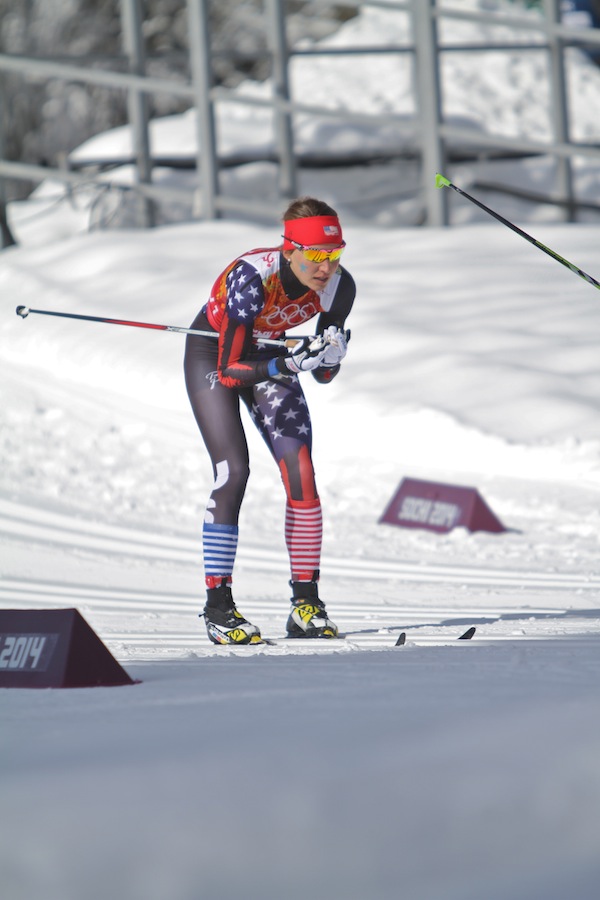
Ready for anything, Caldwell said she did her best to stay in contact for the first leg of the final. She had her work cut out for her — the other semifinal winner, Finland’s Aino-Kaisa Saarinen (scrambling for teammate Kerttu Niskanen) had pushed the pace out of the start with Østberg and Ingemarsdotter. Caldwell said the pace was noticeably faster than her semifinal and turned out to be “a fight the whole time.”
She held her own, despite some contact with Ingemarsdotter on the last downhill before the exchange, tagging Randall in fourth, 1 1/2 seconds behind Saarinen up front.
“When you make the finals like this, you kind of just want to hang on for as long as possible until you blow up,” Caldwell said. “Maybe if you’re one of those top teams there’s pacing involved, but for someone like me, it’s basically hang on for dear life for as long as possible.”
From there, Bjørgen broke away for Norway and Randall moved to fifth behind Germany’s Denise Herrmann. By the end of the lap, Randall was in sixth, 4.7 seconds behind Poland’s Justyna Kowalczyk in fifth and 2.6 seconds back from Herrmann.
By the second exchange, Bjørgen had opened up a 2.84-second gap on Niskanen in second, who was just half a second ahead of Nilsson in third.
The next time around, Caldwell held their position in sixth, but came through 15 seconds out of the lead and 10.6 seconds out of medal contention. Randall completed the next lap in seventh place, 25 seconds behind Norway in the lead and 15 seconds back from third.
The Americans’ chances of finishing on the podium weren’t impossible, but the task became increasingly harder as Norway extended the gap and Finland consistently skied in second behind them. Sweden and Germany ultimately sprinted for third, with Nilsson getting the one-second edge for bronze.
Caldwell and Randall placed eighth, 44.03 seconds behind the Norwegian gold medalists and about 25 seconds off the podium. They finished 23 seconds behind Germany in fourth, 12.5 seconds back from Poland in fifth, three seconds behind Russia in sixth, and 2.6 seconds behind Switzerland in seventh. Before the second-to-last exchange, the two Americans slipped to eighth, nearly 35 seconds behind the leaders.
“I think one of my strengths is being able to follow people, and try to go a little easier than they are.” Caldwell said. “Because it went out so quickly, I went really hard that first leg and then the rest of the time, it’s a lot harder for me to be able to catch people than if they take it out at an easier pace — then that helps me, but they didn’t.”
Caldwell said she has a “little ways” to go until she can dictate the pace in races like these, which require both fast-twitch and endurance abilities.
“Distance skiing is something I’ve been working on a lot, and I think I need some big jumps,” she said. “The three-minute break in between [legs] definitely helps me, but it’s still kind of a distance effort.”
“It’s certainly not the Olympics I was hoping for. … It’s two weeks out of four years. You hope to find the best shape you have ever had, and unfortunately for me, I missed the mark somehow. I am not sure quite why.” — Kikkan Randall
Four years ago, the U.S. women placed sixth in the freestyle team sprint with Randall and Caitlin (formerly Compton) Gregg. Last year, Randall and Jessie Diggins teamed up for a first-ever U.S. gold at World Championships, also in a skate team sprint.
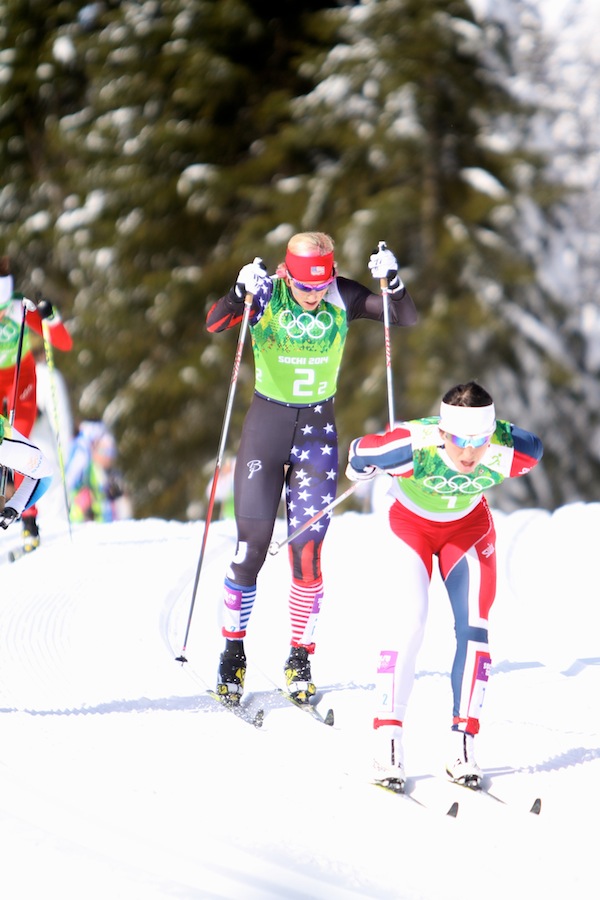
But classic sprinting is different, especially for the U.S. women’s team.
“They left everything out there on the course; they went as hard as they could,” Grover said. “We weren’t ready as a nation. We weren’t ready to ski the pace of the final, that those three teams were racing in. … The Norwegians, the Swedes and the Finns were ready to go out and lay down six really fast legs right from the get-go.
“Last year at the World Championships, we have the women to do that, especially in the skate sprint,” he added. “We’re just not quite there yet in classic.”
Randall said she felt good warming up and anticipated that the final was going to be equally hard for everyone in it.
“Team sprints are challenging in that you never really feel good, you have to convince yourself that you do,” she said. “The teams that have shown that they are in great shape here really showed their strength today, and it was cool to see them really push it from the gun, not be too strategic, just put it out there. You could see by the bodies at the finish that everybody went pretty hard.”
As for her race, Randall said she came in ready to go and prepared for a faster race. But, similar to the relay a few days ago, her legs felt “flooded” on the first hill.
“I just didn’t have the same pop that I had this morning, kind of a similar theme that I’ve had all through the last couple of weeks,” she said.
Regardless, she continued to fight for a top place — even if it wasn’t on the podium.
“Even though we weren’t up there fighting for the medals where we wanted to be, I knew Sophie was skiing well and she could go for any position,” Randall said.
Caldwell said it was simply a dream to be named to a two-person Olympic team with Randall.
“It’s been a lot more than I could have imagined,” she said of after the last race of her first Olympics. “I had a really strong skate sprint, probably the best race of my life, and after that I was just kind of happy to get any start that I was offered. I’ve dreamed of being on a sprint relay with Kikkan for as long as I can remember, so I was pretty excited.”
Randall said her fourth Olympics left something to be desired, but also recognized that her struggles with timing peak performances boiled down to the nature of the sport.
“If it was an exact formula, everybody would be peaking,” Randall said. “And that’s probably what the intrigue is at the Olympics: who is going to get it right and who is not. We tried the best we could. I’ve had a long career; we had lots of good examples. We put together a plan that we really felt confident in.”
“I’ve dreamed of being on a sprint relay with Kikkan for as long as I can remember, so I was pretty excited.” — Sophie Caldwell
Randall said there were some “funny things with the venue and snow” that contributed to some of her team’s lackluster results, in certain races on both the women’s and men’s side.
“When you give it everything you had and you try hard, you have to be satisfied with that,” she said. “The medals are nice and the results are great, but yeah, we gave it the best we had. I’m still going to walk away from this Olympics satisfied that we did that.”
That said, her accumulation of results in three Olympic races, with the team-sprint eighth being her best, wasn’t what she envisioned coming in.
“It’s certainly not the Olympics I was hoping for,” Randall said. “It’s a funny thing; it’s two weeks out of four years. You hope to find the best shape you have ever had, and unfortunately for me, I missed the mark somehow. I am not sure quite why.
“Every race I come into, I’m hoping to turn it around. I just haven’t had the feelings that I’ve had in my races coming in,” she added. “It’s not the way I wanted it to go, but I promised myself coming in that I wanted to give it everything I had, and I know I’ve done that. We’ll have another chance in four years and I know these girls can do it.”
Randall hasn’t ruled out competing at the next Winter Games in PyeongChang, South Korea.
— Nat Herz and Chelsea Little contributed reporting
Alex Kochon
Alex Kochon (alexkochon@gmail.com) is a former FasterSkier editor and roving reporter who never really lost touch with the nordic scene. A freelance writer, editor, and outdoor-loving mom of two, she lives in northeastern New York and enjoys adventuring in the Adirondacks. She shares her passion for sports and recreation as the co-founder of "Ride On! Mountain Bike Trail Guide" and a sales and content contributor at Curated.com. When she's not skiing or chasing her kids around, Alex assists authors as a production and marketing coordinator for iPub Global Connection.

